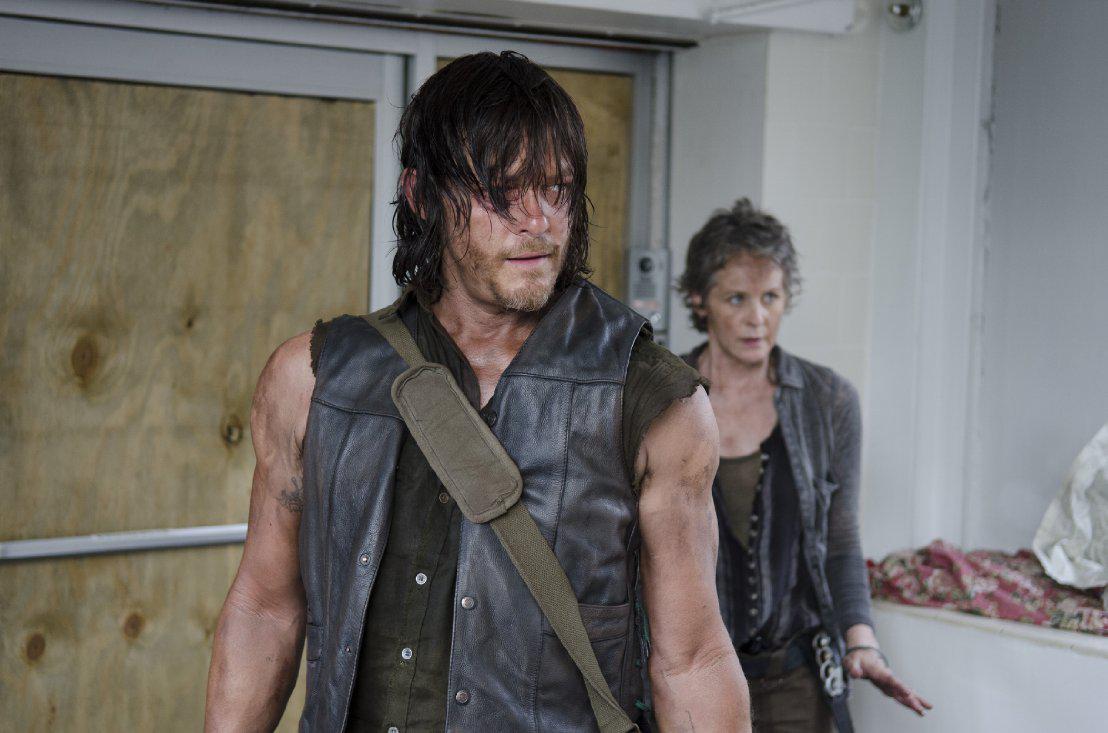This post contains spoilers.
There’s little doubt that Sunday’s season finale of The Walking Dead is going to be bloody. This season started out strong with three intense episodes, but has become bloated with half-baked story arcs that seem to have no resolution in sight. We spent half a season rooting for cheerful farm girl Beth, who proceeded to die in the most nonsensical way possible. And the guy she ostensibly died to save died nine episodes later. In the comics, Maggie becomes suicidal after losing her family.* But in the show, her emotional responses to Beth’s death were all downplayed and condensed to make room for the reactions of another character—Daryl Dixon, the show’s ruggedly handsome, crossbow-toting, strong-but-silent type. So there’s one thing I’d argue needs to happen in the finale in order to rescue this season: The Walking Dead should kill off Daryl, its most beloved character.
In a series that loves to remind viewers that no character is safe, Daryl seems unkillable. He’s got that effortless swagger, a no-nonsense attitude, and biceps that just won’t quit. The world of Walking Dead is crawling with deeply unlikable characters. (Looking at you, Fake-Scientist Eugene and Gabriel, Coward Extraordinaire.) Daryl is different—he inspires endless GIFs and posts to the tune of “14 reasons We Love Daryl Dixon.” And the source of his popularity—aside from those brooding good looks—is his unknowability: his blank stoicism in the face of disaster.
Daryl started out as one of the show’s most promising characters: a loner redneck stereotype who quickly turned into a fan favorite when he became hell-bent on finding meek-housewife-turned-badass Carol’s daughter, Sophia. Discovering Sophia was dead could have been a soul-baring moment, but it never happened. Sure, it made sense that the writers would want to maintain Daryl’s air of mystery for as long as possible. But this pattern of love, lose, repeat is basically the only storyline he gets every season—while the trauma has no recognizable impact on his closed-off demeanor. Even having to kill the zombified resurrection of his older brother, Merle, in Season 3 was not enough to crack Daryl open. Neither was finding out that Carol, one of his closest friends in the party, had been banished from the prison—an apparent death sentence. So at this point, Daryl’s mysteriousness has become a crutch that the writers use to justify his flatlining character development.
Daryl is always in action, and never gets to take the kind of reflective pauses that give other surviving core characters like Rick and Michonne such depth. We watched Rick go off the deep end after losing his wife, Lori. Since Season 1, we’ve seen Good Guy Rick, Ricktatorship Rick, Farmer Rick, and Crazy Hallucinating Rick, among others. But after all that’s happened, Daryl is still basically just a not-racist version of his former loner self—with longer hair. We’re only given crumbs to work with when imagining what could possibly lie within, like that poignant moment at Grady Memorial Hospital when the book he’d picked up about treating childhood abuse falls out of his bag in front of Carol, a domestic violence survivor herself. Because his inner workings are so hazy, Daryl’s distinguishing features are his abilities, not his personality. And at this point, being good at killing stuff isn’t enough to make you special on The Walking Dead—everyone except the baby and the useless priest can hold their own in combat.
The time Daryl spent with Beth in Season 4 was as close as we’ve gotten to really seeing what makes him tick. He vaguely (and angrily) alluded to a sad backstory while they were drinking, and then let off steam by torturing a walker. Yes, we found out that somewhere deep inside, he’s scared and vulnerable and harbors demons. But then Beth disappeared, he raced to find and rescue her, and she ended up dead. (Because everyone Daryl loves dies.) And now, with Beth gone, he’s quickly returned to his favorite pastimes: Fighting, sulking and briefly branching off from the party for brief, treacherous adventures. This character who initially seemed like an emotional time bomb, an intriguing blank slate to be filled, has proven completely unbreakable in every possible way—and that’s boring, especially in a show that predominantly develops through characters’ evolving vulnerabilities.
I know it’s unlikely that Daryl will die. There’s a whole group of viewers who say, “If Daryl dies, we riot.” This has been a popular battle cry for years, complete with T-shirts and petitions. (Petitions aren’t exactly rare for this fandom, to be fair—here’s one to build a statue of Rick on horseback in Atlanta.) I’m still holding out hope that the writers really do have a slow-burning plan to develop Daryl. It’s been pretty heavily implied for several seasons, from the time he first became so focused on finding Sophia to the time he grabbed that book, that Daryl was abused as a child. But for five seasons, the writers have proven they’re unwilling to let their brooding hero open up about it, and when viewed from the outside only, it’s hard to engage with that inner turmoil. All we’re left with is his far less interesting invincible exterior. Daryl doesn’t just weigh the narrative down—he also disrupts multiple characters’ story arcs. As long as he’s on the show, the writers will be forced to adjust the narrative in the comic books, since Daryl was never in the comics to begin with. (And by “adjust,” I mean shortchange other characters and kill them off prematurely.) So for the sake of the future of Walking Dead, it’s time to get rid of Daryl for good.
Correction, March 27, 2015: This post originally misstated that in the comics Beth’s death prompted Maggie’s suicide attempt. In the comics, Maggie attempted suicide because she lost her brother and father.
